-
 bitcoin
bitcoin $87959.907984 USD
1.34% -
 ethereum
ethereum $2920.497338 USD
3.04% -
 tether
tether $0.999775 USD
0.00% -
 xrp
xrp $2.237324 USD
8.12% -
 bnb
bnb $860.243768 USD
0.90% -
 solana
solana $138.089498 USD
5.43% -
 usd-coin
usd-coin $0.999807 USD
0.01% -
 tron
tron $0.272801 USD
-1.53% -
 dogecoin
dogecoin $0.150904 USD
2.96% -
 cardano
cardano $0.421635 USD
1.97% -
 hyperliquid
hyperliquid $32.152445 USD
2.23% -
 bitcoin-cash
bitcoin-cash $533.301069 USD
-1.94% -
 chainlink
chainlink $12.953417 USD
2.68% -
 unus-sed-leo
unus-sed-leo $9.535951 USD
0.73% -
 zcash
zcash $521.483386 USD
-2.87%
What is the difference between USDT and USD?
USDT, a cryptocurrency pegged to the USD, offers digital transaction flexibility but lacks the USD's government backing and inherent stability, exposing users to market volatility and exchange risks.
Mar 11, 2025 at 07:05 am
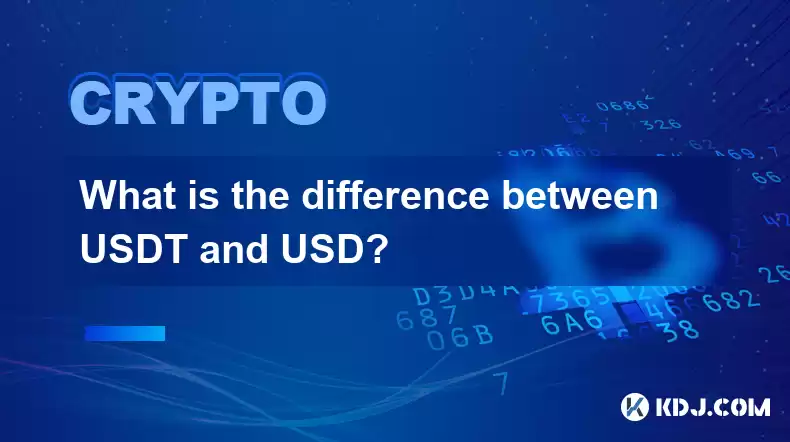
- USDT (Tether) is a cryptocurrency pegged to the US dollar (USD). This means one USDT theoretically represents one USD.
- USD is the official currency of the United States, a fiat currency backed by the government.
- The key difference lies in their nature: one is a digital token, the other is a government-issued currency.
- USDT's value fluctuates slightly due to market forces and concerns about its reserves, unlike the relatively stable USD.
- Using USDT involves the risks associated with cryptocurrency exchanges and blockchain technology, while USD transactions are subject to traditional banking regulations.
The fundamental distinction between USDT (Tether) and USD (United States Dollar) lies in their nature and how they function within the financial ecosystem. USD is a fiat currency, meaning its value is determined by government decree and is backed by the full faith and credit of the United States government. Transactions in USD are processed through traditional banking systems and are subject to regulatory oversight. This established system provides a degree of stability and trust, albeit with its own limitations.
In contrast, USDT is a cryptocurrency, a digital token designed to maintain a 1:1 peg with the USD. This means that theoretically, one USDT should always be worth one USD. However, this peg isn't always perfectly maintained, and fluctuations can occur due to market forces and concerns surrounding the reserves held by Tether to back its tokens. These reserves are a frequent subject of scrutiny and debate within the cryptocurrency community. Transactions in USDT occur on the blockchain and are processed through cryptocurrency exchanges, a different environment with different risks and regulations.
The process of acquiring USDT typically involves purchasing it on a cryptocurrency exchange using either fiat currency (like USD) or another cryptocurrency. Once acquired, USDT can be used for various purposes within the cryptocurrency ecosystem, such as trading other cryptocurrencies or making payments on decentralized platforms. This flexibility is a key advantage for users within the crypto sphere.
The stability of USDT is a frequent point of discussion. While aiming for a 1:1 peg with the USD, USDT's value can deviate from this target due to several factors. Market demand and supply dynamics can influence its price. Concerns about the transparency and adequacy of Tether's reserves can also lead to fluctuations. These fluctuations, though often small, represent a significant difference compared to the relative stability of the USD, which is subject to far less volatility.
Unlike the USD, which is governed by established financial institutions and regulatory bodies, USDT operates within the decentralized realm of cryptocurrency. This means it is subject to different risks and lacks the same level of regulatory oversight as traditional currencies. While this can offer advantages in terms of accessibility and speed of transactions, it also introduces risks associated with the security of cryptocurrency exchanges, the potential for hacks or scams, and the overall volatility of the cryptocurrency market.
The regulatory landscape surrounding USDT and other stablecoins is constantly evolving. Governments worldwide are grappling with how to regulate these digital assets, and the regulatory environment can differ significantly across jurisdictions. This uncertainty adds another layer of complexity to the comparison between USDT and USD.
Furthermore, the accessibility of each currency differs significantly. USD is widely accepted globally for various transactions and readily available through traditional banking systems. Accessing USDT, on the other hand, requires navigating the world of cryptocurrency exchanges, which may have varying levels of accessibility and user-friendliness.
Common Questions:Q: Is USDT a safe alternative to USD?A: USDT's safety is a complex issue. While it aims to mirror the USD, its value is not guaranteed to remain stable at 1:1, unlike the USD which is backed by a government. Furthermore, the transparency and security of Tether's reserves remain subjects of debate, introducing additional risk.
Q: Can I use USDT for everyday purchases like I use USD?A: Currently, the widespread adoption of USDT for everyday purchases is limited. While some merchants may accept USDT, it is far from as widely accepted as USD. The infrastructure for using USDT in everyday transactions is still under development.
Q: How do I convert USD to USDT and vice versa?A: To convert USD to USDT, you'll need to create an account on a cryptocurrency exchange that supports USD deposits and USDT trading. You deposit USD, then purchase USDT using the exchange's trading platform. The reverse process is similar: sell your USDT for USD on the exchange and withdraw the USD to your bank account.
Q: What are the risks associated with holding USDT?A: The risks include the possibility of USDT's price deviating from its intended 1:1 peg with the USD, potential security breaches on cryptocurrency exchanges, and the inherent volatility of the cryptocurrency market. Additionally, regulatory uncertainty surrounding stablecoins poses a risk.
Q: Is USDT regulated in the same way as USD?A: No, USDT is not regulated in the same way as USD. USD is subject to the regulations of the US government and banking systems, while the regulatory landscape for USDT and other stablecoins is still evolving and varies across different jurisdictions.
Disclaimer:info@kdj.com
The information provided is not trading advice. kdj.com does not assume any responsibility for any investments made based on the information provided in this article. Cryptocurrencies are highly volatile and it is highly recommended that you invest with caution after thorough research!
If you believe that the content used on this website infringes your copyright, please contact us immediately (info@kdj.com) and we will delete it promptly.
- White House Brokers Peace: Crypto, Banks, and the Future of Finance
- 2026-01-31 18:50:01
- Rare Royal Mint Coin Discovery Sparks Value Frenzy: What's Your Change Worth?
- 2026-01-31 18:55:01
- Pi Network's Mainnet Migration Accelerates, Unlocking Millions and Bolstering Pi Coin's Foundation
- 2026-01-31 18:55:01
- Lido's stVaults Revolutionize Ethereum Staking for Institutions
- 2026-01-31 19:25:01
- MegaETH's Bold Bet: No Listing Fees, No Exchange Airdrops, Just Pure Grit
- 2026-01-31 19:20:02
- BlockDAG Presale Delays Raise Questions on Listing Date Amidst Market Scrutiny
- 2026-01-31 19:15:01
Related knowledge

How to choose a reliable USDT exchange service provider? How to identify?
Jun 12,2025 at 03:15pm
Understanding the Role of USDT in Cryptocurrency TradingUSDT (Tether) is one of the most widely used stablecoins in the cryptocurrency market. It is d...
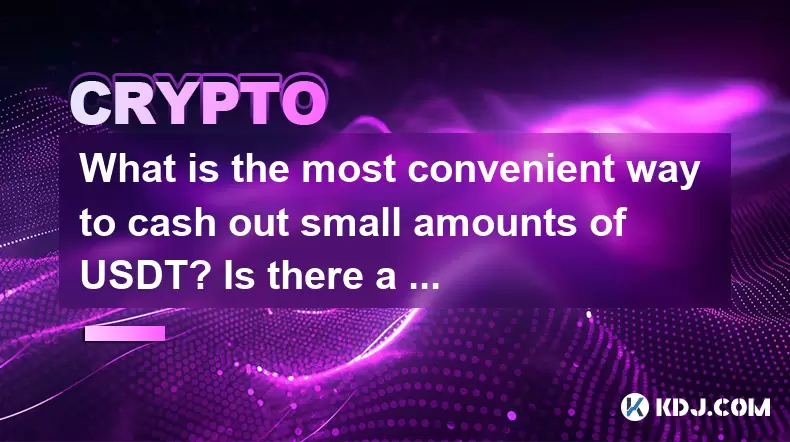
What is the most convenient way to cash out small amounts of USDT? Is there a shortcut?
Jun 11,2025 at 11:00pm
Understanding the Need to Cash Out Small USDT AmountsCashing out small amounts of USDT can be a challenge for many crypto users. Traditional methods o...
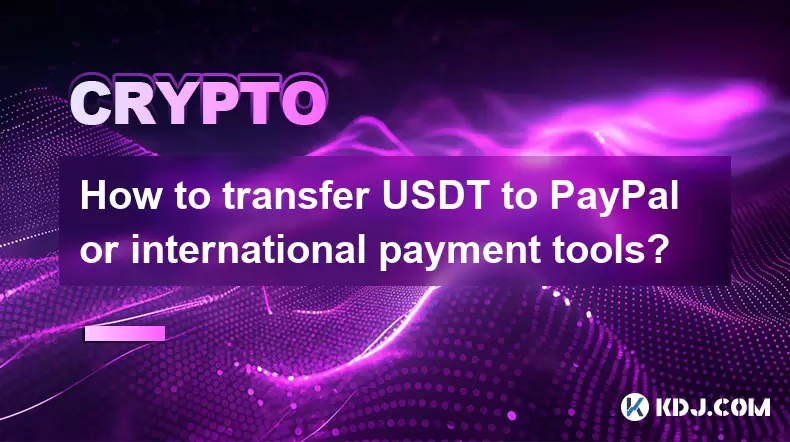
How to transfer USDT to PayPal or international payment tools?
Jun 15,2025 at 05:28am
Understanding the Basics of USDT and PayPal IntegrationUSDT (Tether) is a stablecoin pegged to the US dollar, offering blockchain-based value transfer...
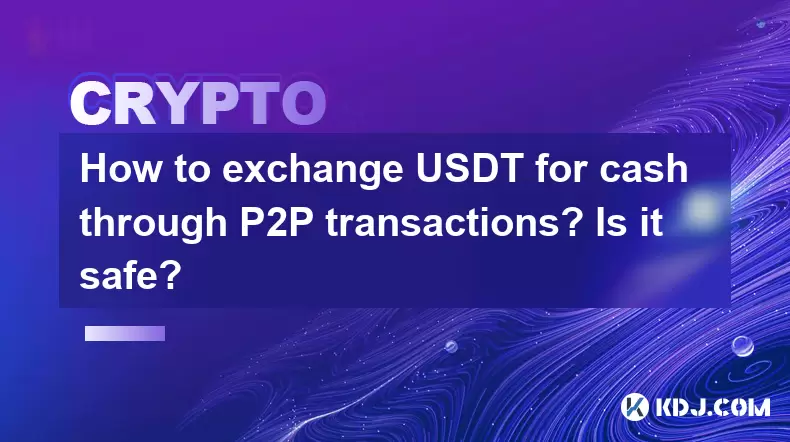
How to exchange USDT for cash through P2P transactions? Is it safe?
Jun 18,2025 at 07:56am
Understanding USDT and P2P TransactionsTether (USDT) is a stablecoin pegged to the value of the US dollar, making it a popular choice for users who wa...
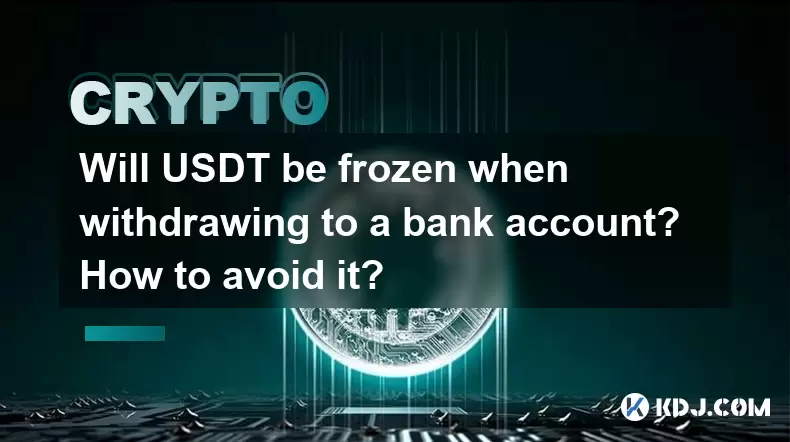
Will USDT be frozen when withdrawing to a bank account? How to avoid it?
Jun 15,2025 at 10:03am
Understanding USDT Withdrawals and Bank Account Freezing RisksWhen users decide to withdraw USDT (Tether) to a bank account, one of the most common co...

How to avoid risks when exchanging USDT for cash? What are the pitfalls?
Jun 11,2025 at 08:14pm
Understanding the Risks of Exchanging USDT for CashWhen exchanging USDT (Tether) for cash, users must be aware of the potential risks involved. As a s...

How to choose a reliable USDT exchange service provider? How to identify?
Jun 12,2025 at 03:15pm
Understanding the Role of USDT in Cryptocurrency TradingUSDT (Tether) is one of the most widely used stablecoins in the cryptocurrency market. It is d...

What is the most convenient way to cash out small amounts of USDT? Is there a shortcut?
Jun 11,2025 at 11:00pm
Understanding the Need to Cash Out Small USDT AmountsCashing out small amounts of USDT can be a challenge for many crypto users. Traditional methods o...

How to transfer USDT to PayPal or international payment tools?
Jun 15,2025 at 05:28am
Understanding the Basics of USDT and PayPal IntegrationUSDT (Tether) is a stablecoin pegged to the US dollar, offering blockchain-based value transfer...

How to exchange USDT for cash through P2P transactions? Is it safe?
Jun 18,2025 at 07:56am
Understanding USDT and P2P TransactionsTether (USDT) is a stablecoin pegged to the value of the US dollar, making it a popular choice for users who wa...

Will USDT be frozen when withdrawing to a bank account? How to avoid it?
Jun 15,2025 at 10:03am
Understanding USDT Withdrawals and Bank Account Freezing RisksWhen users decide to withdraw USDT (Tether) to a bank account, one of the most common co...

How to avoid risks when exchanging USDT for cash? What are the pitfalls?
Jun 11,2025 at 08:14pm
Understanding the Risks of Exchanging USDT for CashWhen exchanging USDT (Tether) for cash, users must be aware of the potential risks involved. As a s...
See all articles





















![Ultra Paracosm by IlIRuLaSIlI [3 coin] | Easy demon | Geometry dash Ultra Paracosm by IlIRuLaSIlI [3 coin] | Easy demon | Geometry dash](/uploads/2026/01/31/cryptocurrencies-news/videos/origin_697d592372464_image_500_375.webp)




















































